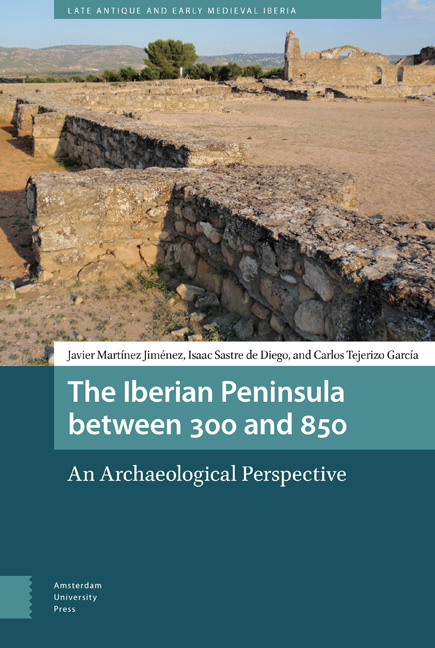Book contents
- Frontmatter
- Contents
- List of Figures
- Acknowledgements
- Preliminary notes
- Preface
- Introduction: An archaeological perspective on the Iberian peninsula between Rome and the Middle Ages
- Part 1 The Late Roman period
- Part 2 The post-Roman period
- Part 3 The Early Middle Ages
- Appendix 1 Site reference table
- Appendix 2 Maps
- Appendix 3 Lists of rulers
- Abbreviations
- Bibliography
- Index
7 - A new material culture: a new society, a new economy
Published online by Cambridge University Press: 10 December 2020
- Frontmatter
- Contents
- List of Figures
- Acknowledgements
- Preliminary notes
- Preface
- Introduction: An archaeological perspective on the Iberian peninsula between Rome and the Middle Ages
- Part 1 The Late Roman period
- Part 2 The post-Roman period
- Part 3 The Early Middle Ages
- Appendix 1 Site reference table
- Appendix 2 Maps
- Appendix 3 Lists of rulers
- Abbreviations
- Bibliography
- Index
Summary
The high degree of economic specialization which was achieved in the Roman world is evident in its material culture. The wide range of pottery typologies, the industrial scale of its productions and the long-distance trade of bulk commodities are witness to it. All this was slowly replaced, once the imperial system collapsed, by a much simpler world in which regional productions and interregional networks had to make do, and where the demand for specialized items plummeted. Only a small elite minority were still linked to Mediterranean trade through the importation of a few luxurious products, such as marble slabs from Greece, oil and wine from Palestine, or personal objects, most of them with a religious character.
In previous chapters we have seen how the transformation and ultimate decline of Rome had a huge impact on the evolution of towns and their rural territories, on the economy and trade. In this chapter we will focus on the material culture and how this fits in the general narrative of the transformations of the Roman world in the Iberian peninsula. Glass, pottery, construction techniques, sculpture, jewellery and coins will be considered here. In all cases it will be seen how the materialities of the post-Roman period emerged as a consequence, as a response to the social, political, and economic changes that began in the late Roman period. Among these post-Roman material realities there are various which stand out; like the end of the specialized Roman production, meaning the abandonment of some techniques and materials, and, as a consequence of this, the loss of knowledge and specialized craftsmen. All of these form the essence of the Late Antique material culture, and it is this that will be replaced in the Early Medieval period by new alternatives once new socio-political dynamics arise.
Snapshots of the new daily life: pottery and glass
One of the most evident transformations in the post-Roman period is how different some daily items were, such as pottery and glass. In the first centuries AD, pottery was produced on a large scale, with an incredible range of typologies, which were traded across the Empire.
- Type
- Chapter
- Information
- The Iberian Peninsula between 300 and 850An Archaeological Perspective, pp. 229 - 264Publisher: Amsterdam University PressPrint publication year: 2018



